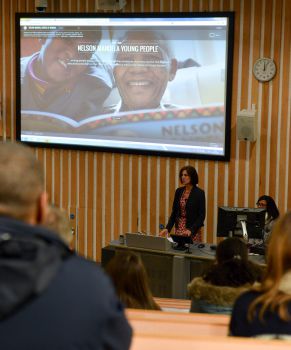Sussex community pays tribute to Nelson Mandela
Posted on behalf of: University of Sussex and the Institute of Development Studies
Last updated: Tuesday, 7 January 2014

Professor Melissa Leach, incoming Director of IDS, chaired a tribute to Nelson Mandela in Fulton in December 2013.
Staff and students – past and present - heard about the University of Sussex’s longstanding links with South Africa at a tribute event on 11 December for the country’s former President, Nelson Mandela, who died last week.
The event in Fulton A lecture theatre was organised by South African Nolo Tsembeyi, an MA Governance student at the Institute of Development Studies (IDS), which is based on the University’s campus.
The incoming Director of IDS, Professor Melissa Leach, chaired the event. She said: “The values and life and legacy of Nelson Mandela are really deeply inscribed into this place, this campus, the University of Sussex, the Institute of Development Studies, in some really vital ways that I think are deeper than many people realise.
“It’s not for nothing that we have Mandela Hall and a set of Nelson Mandela scholarships.
“There’s an intertwining with our history, with the anti-apartheid struggle going back to the 1960s.”
Marcus Williams, Director of Student Recruitment and International Affairs, then spoke about the “rich history” that Sussex shares with Mandela and South Africa.
He reminded the audience of the creation of the Mandela Scholarships in 1973, which enabled students from southern Africa to study at Sussex, and the renaming of Mandela Hall in 1978 in Nelson Mandela’s honour.
Mr Williams then laid out how Sussex plans to further strengthen its links with Africa. He said: “One of our aims in our new strategic plan, which takes us through to 2018, is to develop a number of partnerships. We would hope that at least one of these partnerships will be with an African institution.”
Professor Raphael Kaplinksy spoke about how he came to Sussex from South Africa as a student in the 1960s and went on to become a faculty member of SPRU and later IDS.
Professor Kaplinsky said: “I came to Sussex as a political refugee in 1965 and Sussex was the obvious place to come to.
“Until about 2003 or 2004, Sussex was the single most influential academic institution in South African policy making and with respect to social and economic policy.
“It is really important for us to acknowledge the centrality of Sussex to the development of a democratic South Africa.”
He went on to describe how Sussex’s links with the country and region came in waves, beginning with Thabo Mbeki, Mandela’s successor as President, who studied at Sussex in the 1960s. A number of other South Africans who studied at Sussex would later go on to play important roles in the development of a new South Africa.
A further wave arrived in the late 1980s with a new generation of black South Africans heading to Sussex for their education.
Professor Sir Richard Jolly, former Director of IDS, told of the work he had been involved with in the region with the United Nations, and Mandela’s role in helping to shape this work.
Dorothy Sheridan, Honorary Professor in History, remembered protesting against apartheid while she was a schoolgirl and then as a student at Sussex between 1967 and 1970. She said: “It was obvious that I needed to come to Sussex, which was where I would find a political home.
“It was at Sussex where my own political and educational development continued and I was even more radicalised.
“We established an organisation that we called SUSAC – Sussex University Southern Africa Campaign. Apart from consciousness-raising and political work, we raised enough funds to buy a Land Rover to send to the ANC [African National Congress].
“And of course at that time the ANC was a proscribed organisation. It was countering what a lot of people thought and it was a struggle to raise the money but we did manage to do it.”
Professor JoAnn McGregor, Director of the Sussex Africa Centre, a new research centre to be launched at Sussex in late 2014, pointed out that Mandela was a Communist Party member and committed to “revolutionary” economic transformation. She said: “This aspect of his life is often brushed aside or glossed over but the quest for economic and social justice remains as important as ever in this era of gaping, or perhaps even widening, economic inequalities.”
Kayaletu Tshiki, who is studying at Sussex under the Mandela Scholarship, spoke about growing up in South Africa and the impact that Mandela had upon him.
“I remember very vividly when the late President Nelson Mandela was about to be released from prison. There was excitement everywhere and I joined in the excitement.
“Nelson Mandela has brought hope to South Africa. Not only to South Africa but to Africa and to the world. He is not just a South African, he is a global citizen and he has taught us that our differences do not really matter.
“He has taught us that the world cannot be a better place if, as individuals, we do not make it to be.
“Most of the finest Africans who have gone on to do wonders, not only for Africa but for the world, have been taught in this university. And I hope that the trend of creating leaders that come from this university will continue.”
Following the presentations, a YouTube film about Nelson Mandela’s life was shown.
Members of the audience then had the chance to give their own thoughts on Mandela’s passing and sign a tribute book.
If you would like to make a donation to the Mandela Scholarship Fund, please contact Sue Cornford: E sue.c@sussexstudent.com, T 01273 877470.

